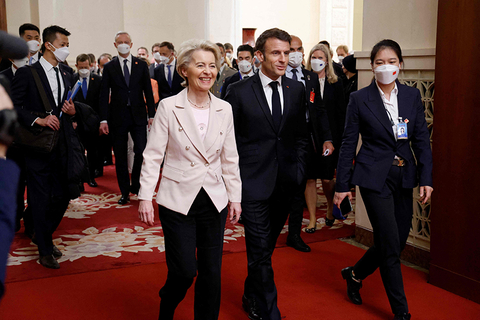
In early April, French President Emmanuel Macron and European Commission President Ursula von der Leyen visited China as the first foreign leaders to do so following China's "Two Sessions" and instalment of a new government.
Compared to the visits to China of German Chancellor Olaf Scholz in November 2022 and European Council President Charles Michel in December 2022, Macron and von der Leyen's visit coincided with the one-year anniversary of the Russia-Ukraine conflict and China's official proposal for a political solution to the Ukraine crisis.
China's willingness to work with all parties, including Europe, to promote dialogue and resolve conflicts through political means received acknowledgment and response during these high-level interactions between China and France, as well as China and the European Union.
Read more China and France Deepen Trade, Political Ties as Macron Visits
During her visit, von der Leyen stated that in its position paper China not only strongly called for the non-use of nuclear weapons but also opposed even the threat of their use.
As Fu Cong, head of the Chinese Mission to the European Union, recently said in an interview, in China’s diplomatic tradition, "China is a friend to both Russia and Ukraine." China's stance on the Ukrainian crisis "should not become a turning point in China-EU relations," and such relations should not be viewed solely through the "prism" of the Ukrainian crisis.
Indeed, the Ukrainian crisis has had different emotional and geopolitical impacts on European countries and China. However, both Europe and China share the same concerns about the humanitarian crisis, nuclear facility safety, food security and agricultural export channels, as well as the urgent call to protect civilians and treat prisoners of war according to international law.
Decoupling or de-risking
Chinese President Xi Jinping emphasized in the meetings that “China and the EU should strengthen communication, establish a correct mutual understanding, and avoid misunderstandings and mis-judgments.”
He added that "China's development of bilateral relations with any country is not aimed at, dependent on, or subject to any third party."
During their visit, Macron aimed not only to engage in strategic communication with China regarding the crisis in Ukraine but also to demonstrate the European leadership's response to the "decoupling" narrative.
Macron cited the notion of an "inescapable spiral" of tension between China and the West. However, he countered that and said “we mustn’t decouple with China.”
Von der Leyen, speaking to the media in Beijing, noted that some have called for "decoupling" from China as the EU becomes more vigilant about issues of "dependence." However, she expressed doubts about the viability of decoupling and even questioned whether it was a strategy desired by Europeans.
Von der Leyen reiterated the concept of "de-risking" in Beijing, which she had introduced before her visit, as a response and alternative to the so-called "decoupling" narrative. She emphasized that the focus of "de-risking" measures should be on specific projects, with different risks addressed through various means—such as diversifying trade and investment relations, implementing export controls to counter the risk of sensitive technology leakage, and conducting investment reviews. Nonetheless, she stressed the need to recognize that there are numerous goods, services, and trade between China and the EU that pose no risk.
In contrast to the unilateral nature of "decoupling," von der Leyen sought to portray "de-risking" as a process that both sides could address through consultation and joint efforts.
Von der Leyen revealed that during her talks with Chinese leaders in Beijing, she proposed, and both sides agreed, that China and the EU would resume high-level economic and trade dialogues. The High-level Digital Dialogue between China and the EU will also be resumed, although the Comprehensive Agreement on Investment was not discussed this time.
Following the recent visits, EU High Representative for Foreign Affairs and Security Policy Josep Borrell and European Commission First Vice President Frans Timmermans are also set to visit China. The various levels of interaction between China and the EU will be largely resumed, injecting momentum into resolving and coordinating more specific issues.
Overall, these converging and even consensus-building strategic positions during this week’s visits send a powerful message to the international community about China's clear and genuine stance amid the current Russia-Ukraine situation. This will likely enhance the prospects for a political resolution of the Ukrainian crisis.
In addition, the various engagement mechanisms to be resumed or continued between China and France, as well as China and the EU, will begin addressing various practical issues in trade and economic sectors. This will contribute to creating a more favorable business environment, reflecting the resilience of China-EU economic ties.
Following China's "Two Sessions" and the onset of a new political landscape, this round of high-level interaction has revitalized the original commitment to the independence and autonomy of Sino-French and Sino-European relations, focusing on their respective positions and specific approaches to resolving crises.
If these high-level consensuses are effectively implemented, they may lead to more actions and tangible outcomes in Sino-French and China-EU relations. Only with that, leaders’ strong comments rejecting the "decoupling" narrative and the emphasis on the value of strategic communication can become a reality.
Xu Heqian is the international affairs editor for Caixin media, and Li Yi is a reporter on international affairs.
Get our weekly free Must-Read newsletter.



!["[T]he First and Fifth Amendments Require ICE to Provide Information About the Whereabouts of a Detained Person"](https://images.inkl.com/s3/publisher/cover/212/reason-cover.png?w=600)



